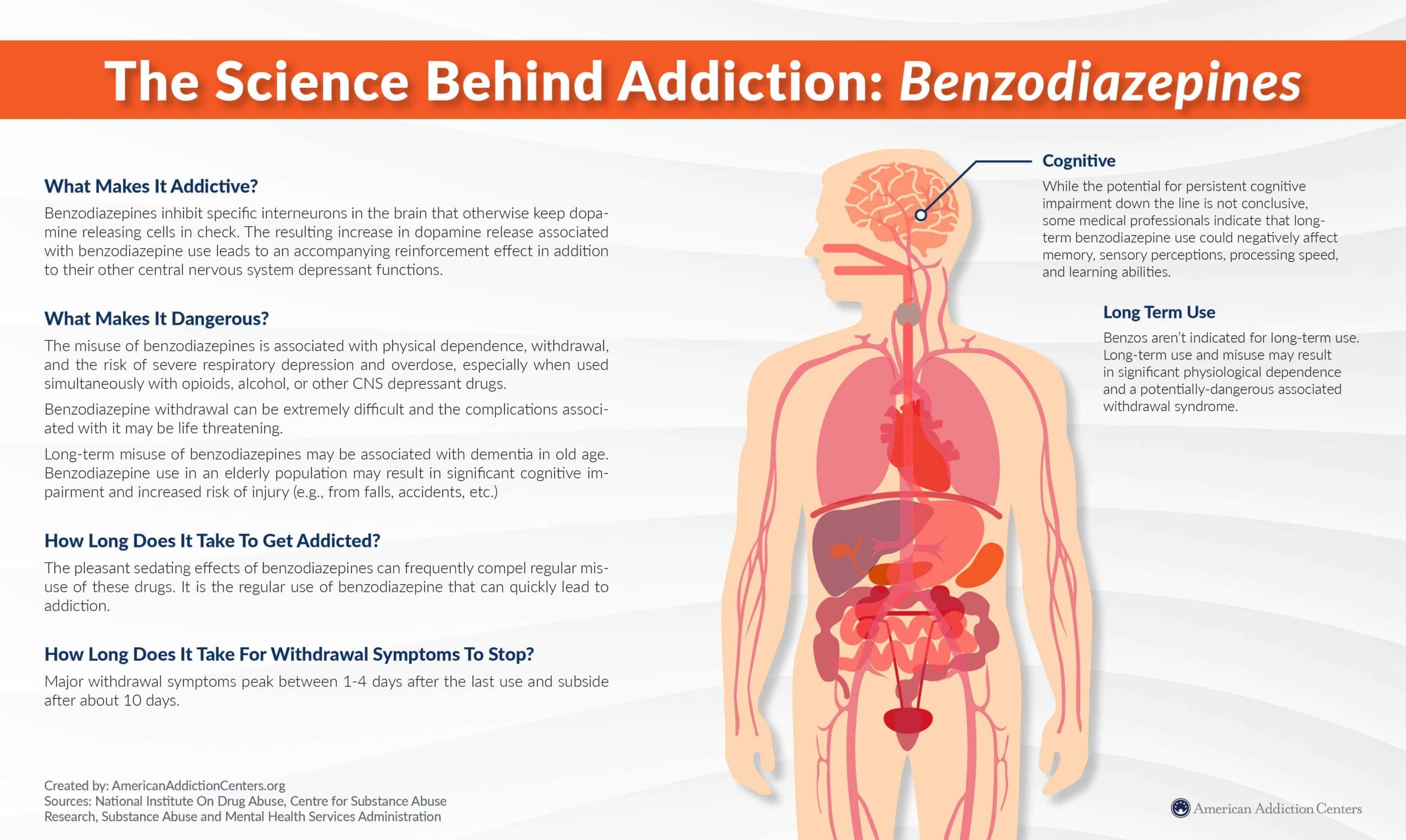Benzodiazepine Addiction: Signs, Effects, and Treatment
Benzodiazepines are a class of central nervous system (CNS) depressant drugs prescribed to treat an array of conditions.1 They are often prescribed for the short-term management of anxiety though they have some potential for dependence and misuse.1,2 Although benzodiazepines are generally safe when used short term as prescribed, they can be dangerous when misused or combined with other substances.2
Read on to discover more about benzodiazepines, including a list of common benzos, their therapeutic effects, as well as signs of benzodiazepine misuse, dependence, and addiction.
What are Benzodiazepines?
Benzos are a group of widely prescribed sedative medications often used to treat panic, anxiety, muscle spasms, and seizures, as well as for alcohol withdrawal management.2,3 According to the 2021 National Survey on Drug Use and Health, more than 25 million people aged 12 and older used prescription benzodiazepines in the last year.4
However, in addition to their therapeutic benefits, benzos can also be addictive.2 In fact, even as prescription substances, their use is often limited to a few weeks or less since there may be an increased risk of dependence, misuse, and addiction with longer-term use.5,6
Benzodiazepines are commonly misused for nonmedical purposes. In 2021, for example, 1.4 percent of people aged 12 and older (3.9 million people) misused prescription benzodiazepines in the last year, with the largest percentage of users between the ages of 18 to 25.7
Benzo misuse can involve:8
- Taking someone else’s medicine.
- Using the drug to get high (i.e., for its effects).
- Taking the drug in a way or dose other than was prescribed.
Those who misuse benzodiazepines may take more than the recommended dosage to produce a euphoric effect. However, those who misuse benzos often misuse other substances as well. In this regard, benzos are sometimes employed to increase the euphoric effects of other substances, or as “downers” to help relieve adverse effects of cocaine or other substances (e.g., self-medicating the unpleasant effects of alcohol withdrawal). Some benzodiazepines have also been used to facilitate sexual assaults.1
What are benzodiazepines classified as?
Benzodiazepines are a Schedule IV controlled substance according to the Controlled Substances Act.1
What do benzodiazepines look like, how do people take them, and how long do they last?
Some benzodiazepines are prescribed in tablet form and intended for oral use, but those who misuse them may also crush the tablets and snort them.3 Some benzos start to work very quickly, with effects typically lasting between 6 to 24 hours or longer, depending on the specific medication.2,9
Side Effects of Benzodiazepines
When taken as prescribed and for no more than a few weeks, benzodiazepines are relatively safe and effective.5 However, benzos may have certain side effects, which may become more pronounced with misuse.10
Drowsiness, fatigue, and lethargy are common benzodiazepine side effects. As doses rise, benzodiazepines can have additional adverse effects, such as:10
- Impaired motor coordination.
- Slurred speech.
- Blurry vision.
- Dizziness.
- Vertigo.
- Mood changes.
- Hostile/erratic behavior.
While benzodiazepines aren’t likely to cause fatal overdoses on their own, when they are combined with opioids or other CNS depressants—such as alcohol, prescription sleeping medications, or other sedatives—they can significantly increase the risk of death and overdose toxicity.2
Benzodiazepine Addiction and Abuse
Are benzodiazepines addictive? In a word, yes. Use and misuse of benzodiazepines can lead to addiction or substance use disorder. Over time, long-term use can result in significant tolerance, requiring more or higher doses to generate the desired effects and ultimately driving compulsive patterns of misuse.8 Plus, benzos can have highly reinforcing effects, making some people want to continue taking them.2
How addictive are benzodiazepines?
As Schedule IV substances, they’re classified as drugs with a potential for abuse and dependence relatively lower than for some other substances such as opioid painkillers and certain stimulants.11
Signs of Benzo Addiction
According to the American Psychiatric Association’s Diagnostic and Statistical Manual of Mental Disorders (DSM-5), a sedative, hypnotic, or anxiolytic use disorder is characterized as a pattern of use that causes significant distress or impairment in daily functioning, including at least two of the following symptoms occurring within a one-year period:12
- Use of the drug in larger doses or for a longer period than had been intended.
- A persistent desire to use or repeated unsuccessful attempts to decrease or cease use.
- Spending an inordinate amount of time attempting to procure the drug, use it, or get over its effects.
- Cravings, urges, or a desire to use.
- Recurrent use resulting in failure to fulfill obligations at school, home, or work.
- Continued use despite negative effects on social life and interpersonal relationships.
- Reduced recreational, work, or social activities reduced or abandoned because of continued drug use.
- Repeated use in environments or situations where it could cause physical harm.
- Ongoing use even with the knowledge that physical and/or psychological problems. are likely to have either been caused or worsened by use.
- Tolerance, which is defined as a need for markedly increased amounts of a substance to achieve intoxication or desired effect or a markedly diminished effect with continued use of the same amount of the substance. (This criterion doesn’t count toward diagnosis if a sedative/hypnotic/anxiolytic is being used as prescribed a physician.)
- Experiencing withdrawal symptoms or taking the substance to relieve or avoid withdrawal symptoms. (This criterion doesn’t count toward diagnosis if a sedative/hypnotic/anxiolytic is being used as prescribed by a physician.)
If you suspect that you or someone you care about might have issues with benzodiazepine abuse, knowing the symptoms that are associated with an addiction to benzodiazepines can help you identify potential issues. However, only a healthcare professional can officially provide a diagnosis.

Benzodiazepine addiction can impact cognitive functioning as well as significant physiological dependence and a potentially-dangerous associated withdrawal syndrome.
Benzodiazepine Overdose
An overdose can occur when a large enough dose of a drug is taken to result in life-threatening and/or fatal symptoms.8 The signs and symptoms of a benzo overdose may include:3,9
- Over-sedation or drowsiness.
- Confusion.
- Impaired coordination.
- Slurred speech.
- Reduced reflexes.
- Respiratory depression.
- Loss of consciousness.
- Coma.
- Death.
An overdose of benzos alone may not always be fatal. However, many people who misuse benzodiazepines also use other substances such as prescription or illicit opioids, which can greatly increase the risk of adverse drug effects, polysubstance toxicity, and death.13
If you suspect someone is overdosing on benzodiazepines or other substances:14,15
- Call 911.
- Administer naloxone (e.g., Narcan) if available. It quickly reverses the effects of an opioid overdose but won’t harm someone overdosing on a different substance.
- Attempt to keep the person awake and breathing.
- Position the person on their side so that they don’t choke if they vomit.
- Stay with the person until help arrives.
Benzodiazepine Withdrawal
When a person who is physically dependent on benzos suddenly stops taking them or dramatically reduces the dose, they will likely experience benzodiazepine withdrawal symptoms as their brain adjusts to the absence of the drug.2,12
Withdrawal symptoms may start as early as a few hours after the last dose was taken. They can include the following symptoms, among others:8
- Insomnia.
- Anxiety.
- Agitation.
- Hallucinations.
- Severe cravings.
- Racing pulse and increased blood pressure.
- Increased body temperature and sweating.
- Overactive reflexes.
- Shakiness or tremors.
- Seizures.
People who have used high doses of benzodiazepines for long periods of time may be more likely to experience seizures and delirium.13
Benzodiazepine Withdrawal Management and Addiction Treatment
If you or a loved one is misusing benzodiazepines, treatment is available, and many formats and therapies are offered to suit your unique needs.
The road to recovery often starts with detox and withdrawal management. In fact, it’s not recommended that people attempt benzodiazepine withdrawal without the aid of medical supervision.13 Detox-facility staff will monitor the progression of your withdrawal symptoms around the clock while administering medications to ensure you’re as safe and comfortable as possible.16
Detox is an important element of recovery from benzodiazepine addiction. Detox by itself, however, may not be able to fully address the behavioral, psychological, and social issues associated with addiction. As such, it should be followed by a more comprehensive substance use disorder treatment.16
Treatment for benzodiazepine addiction includes the following options, each one of which can be tailored to address your unique needs:13,16,17
- Inpatient. With inpatient treatment, patients stay at a facility during treatment, where they receive intensive group and individual therapy sessions and where staff are on site around the clock to offer support. This setting is a good fit for people who have additional physical or mental health issues and those who struggle to stop using benzodiazepines and other substances.
- Outpatient. Those in outpatient treatment attend scheduled group and individual counseling sessions at a facility while living in their own residences, perhaps while attending school and/or work. This care may be most ideal for those with less acute mental or medical health issues and with strong support systems in their home environment.
- Aftercare. Providing ongoing support following inpatient and outpatient programs, aftercare can include sober housing, alumni programs, support groups, self-help meetings, and private therapy, all of which can help to lower your risk of relapsing after completing treatment. Aftercare (aka continuing care) provides some of the structured support offered during treatment while also helping patients adjust to living independently without returning to substance use.
There are multiple behavioral therapy techniques that can be used for treating benzodiazepine addiction. Common options include:8,16
- Cognitive-behavioral therapy (CBT) helps change unhelpful thoughts, actions, and beliefs; develop better stress management skills; identify high-risk situations; and create a plan to avoid relapse.
- Contingency Management (CM) uses positive reinforcement by rewarding desirable behaviors, such as attending treatment and staying sober, with small rewards.
- Motivational Enhancement Therapy (MET) works to help manage feelings of ambivalence by exploring feelings and identifying pros and cons of change. It also increases internal motivation to create positive changes.
If you or a loved one is struggling with benzodiazepine misuse or addiction, American Addiction Centers can help. Our programs offer unique treatment options to fit your needs, and facilities across the United States provide treatment options from detox and inpatient treatment to outpatient options and aftercare. Contact our who are available 24/7 to answer your questions and help support you as you take your first steps toward recovery.

